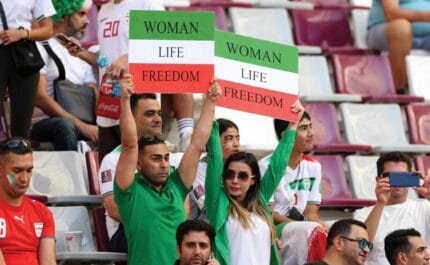This is what happened to the last country that left the EU…
Only one country has left the European community of nations following a referendum before. We spoke to Greenland’s chief negotiator just after the UK voted for Brexit, to find out what to expect once Article 50 has been invoked

Geert van den Wijngaert/AP/Press Association Images
Infographics: Christian Tate
23rd June 2016 (Taken from: #23)
On the evening of Friday 24th June, as the first day of mourning and celebration over the referendum result wound down in the UK, Jean-Claude Juncker gave an interview to German TV station ARD. “It is not an amicable divorce,” the president of the European Commission said of the Brexit vote. “But it was also not an intimate love affair.”
After years of smiling through clenched teeth and attempting to forge ahead despite increasing animosity, Juncker threw in the towel on the relationship with an air of bitterness. The rift was complete and there was no point trying to play nice any more. “I do not understand why the British government needs until October to decide whether to send the divorce letter to Brussels,” he said. “I’d like it immediately.”
That evening, Lars Vesterbirk, 70, was at home in Kragenæs, a Danish village of 120 people about 150 kilometres south of Copenhagen. Juncker’s acidity came as no surprise to him. He had experienced similar treatment firsthand three decades earlier when he was put in charge of the negotiations on Greenland’s withdrawal from what was then the European Economic Community (EEC).
“I think [the EU] will have the same attitude now as they had 30 years ago,” he says. “That when you leave the family, you should not expect to get anything easily.”

Greenland became the first and only country to leave the EEC by popular decree after a referendum was held in 1982. As part of the Danish Kingdom, Greenland had joined the Community in 1973 even though its citizens had voted against membership. Six years later, Denmark granted home rule to the island and a referendum was held, resulting in 52 percent of Greenlanders voting in favour of leaving, the same number as the UK vote. The relatively close result, says Vesterbirk, “had an enormous influence on the atmosphere. We were told again and again that the minority was just as big as the majority and we couldn’t do it,” he says. “I guess you will hear that in Britain as well. It’s the drawback of referendums in a democracy. You have to take it seriously, you have to live with the fact that the majority is the majority.”
The lessons to be drawn for the UK from Greenland’s experiences of withdrawing from the EU are limited, says Vesterbirk – the two territories are so different as to be beyond comparison. Back in 1982, Greenland’s population was only slightly over 50,000, compared to the UK’s 64 million, and its economic importance was equally tiny. European integration was also far less advanced at the time and Greenland’s secession deal revolved almost exclusively around fishing rights, with the fishing industry making up 90 percent of the Greenlandic economy.
We spent a lot of time convincing the EU that of course you can leave – the EU is not a prison”
Still, Vesterbirk sees some core beliefs of EU member states as unchanged and likely to affect the UK’s negotiations. “You ask for membership – you don’t then leave. That’s the attitude of most of the EU members,” he says. “Another fundamental ideology is simply that the advantages of membership are for members, not for those standing on the outside.”
For Vesterbirk, who was negotiating some 25 years before the Lisbon Treaty of 2007 introduced formal procedures for exiting the EU, these core beliefs made for much lengthier and more frustrating negotiations than he had expected. “It was intense. The atmosphere between us and the member states wasn’t good,” he says. “We spent a lot of time convincing the EU that of course you can leave – the EU is not a prison.”

Part of member states’ reluctance to accept Greenland’s decision to leave came from their own internal concerns. “Italy feared that Sicily would do the same, and France was not too happy,” Vesterbirk says. It led to two years of travelling around the continent for discussions with stubborn member states which mainly ended in stalemate, punctuated by only the occasional glimmer of hope.
“There was a meeting with the Italian minister for Europe in Rome,” Vesterbirk says, recalling one such victory. “He simply wasn’t willing to give us anything; [he was] not accepting the referendum’s legitimacy. When [Greenland’s prime minister] Jonathan Motzfeldt finally lost his patience, he said: ‘OK, Mr Fiori, I don’t have any more time for you because I have to go and see the Pope.’ Three days later we got Italy’s approval. We had never thought that a visit to the Pope would have such an influence – we didn’t know that he had anything to do with fishing rights.”
Although Vesterbirk expects the UK’s negotiations to be dauntingly tough, he’s not as pessimistic about the country’s long-term fate as many Remainers. “The UK maybe will not be better off, but not worse,” he says. “At the end of the day, it’s in the interests of both parties to have very close cooperation, especially in trade.”
In the months following the Brexit vote, a recruitment drive has been launched to tackle the UK’s lack of skilled international trade negotiators, caused by the fact that the bulk of negotiations have been handled by the Commission since the 1970s. The cost of hiring these experts has been estimated at £5 billion.
For these men and women, Vesterbirk has one tip: to do their homework better than the Commission’s highly experienced negotiators. “We won because we were much, much better prepared than our counterparts,” he says. “It’s very simple – the Eurocrats have many other things to take care of. They cannot spend all their time over the next five, six years just on Brexit. We still have an EU that should be operating on behalf of the remaining 27 countries,” he says.
The EU itself can do little more than twiddle its thumbs until the UK pushes the button on Article 50 – the Lisbon treaty’s provision that a state must make a formal declaration of its intention to leave in order to trigger an exit process – though some steps have been taken to ready the institution for its divorce battle. Michel Barnier, a French politician, has been chosen as chief negotiator. Described in his former role as EU financial services commissioner as the “scourge of the City”, he has in the past spoken out against a “pick-and-mix” approach to EU membership. European leaders arranged to meet for an informal summit on the future of the EU, to be held on 16th September in Bratislava. No invitation was extended to Theresa May.
Early signs indicate, then, that Juncker was right in predicting this divorce will not be amicable. And it may just be the first in a long series of painful confrontations if the fault lines opened by the referendum – between the people and the parliament, Northern Ireland and the Republic, Gibraltar and Spain, the City and the country, Scotland and the rest of the UK – split open still further.
Slow Journalism in your inbox, plus infographics, offers and more: sign up for the free DG newsletter. Sign me up
Thanks for signing up.








